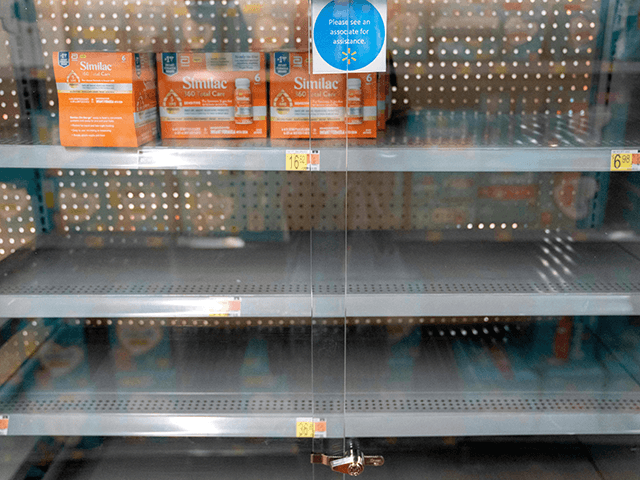Human milk banks across the country are experiencing an increase in demand and donations amid the nationwide baby formula shortage that has left parents scrambling for the precious product to feed their hungry babies.
“For the week ending May 22, almost three-quarters of formula products nationwide were out of stock at some point, up from 45% the week before and about 5% at this point last year,” CNN reported on Tuesday, citing numbers it received from Datasembly. As parents continue to scour pharmacies and supermarkets for formula, milk banks across the country have seen a heightened demand.
Breast milk donations are typically reserved for premature infants “who have medical needs that force them to solely drink human milk, and babies whose biological mothers cannot provide it to them,” WHNT reported. While speaking with CNN, the Medical Director of the Breastfeeding Medicine Clinic at Cincinnati Children’s, Dr. Sheela Rath, said the demand has also increased for premature babies as many formulas are currently unavailable “for sick infants.”
Infants born after term are eligible to benefit from donations too, said Lindsay Groff, Executive Director of the Human Milk Banking Association of North America (HMBANA), according to NBC News. HMBANA’s website states it is comprised “of 31 member milk banks” throughout the United States and Canada.
Groff told the outlet this month that all milk banks she has been in contact with have “seen a major increase in demand” and, while speaking with the Associated Press, noted that demand had jumped 20 percent amid the formula shortage.

Grocery store shelves where baby formula is typically stocked are locked and nearly empty in Washington, DC, on May 11, 2022. (Photo by STEFANI REYNOLDS/AFP via Getty Images)
Along with the heightened demand is an increase in mothers looking to supply breastmilk to meet the need.
Director of the Mother’s Milk Bank of Iowa, Jean Drulis, told Iowa newspaper the Gazette that the bank is “experiencing an increase in milk donors who mention the formula shortage and their desire to help.”
Similarly, donations to the Pittsburgh-based Mid-Atlantic Mothers’ Milk Bank had jumped 20 percent this month, the bank’s executive director, Denise O’Connor, said, according to NBC News.
Hillary Demmon, a mother of a one-year-old and a professor and filmmaker at the University of Pittsburgh, told CNN that she recently began pumping breast milk with the plan to donate it to a local bank to benefit babies during the formula shortage.
“I figured this is something that I can tangibly do in this nightmare timeline we are living in right now to concretely help some other families,” she told the outlet.
Demmon is undergoing an extensive screening process before her milk is collected and distributed to babies in need. The screening includes a meeting she has already had with the bank regarding “her health and the medicines and supplements she’s taking,” in addition to consultations between the bank and her OB-GYN as well as her child’s doctor. Her breast milk will be tested, and she will also undergo a blood test.
In addition to milk banks, Facebook groups have sprouted up where mothers are giving breast milk to other parents in need, but the milk is not screened for contaminants.
“We do warn against informal milk sharing as it does not provide the same safety guarantees and the possibility of serious adverse consequences cannot be ruled out,” Mothers Milk Bank of Alabama CEO Kristina Habchi told WHNT.
The American Academy of Pediatrics (AAP) notes:
Human milk is a biological product; therefore, whether from an infant’s own mother or a donor mother, there will always be concerns about contamination. Possible contaminants are infectious agents, including both bacteria and viruses, and contamination with other substances, most notably toxic components in the environment (eg, pesticides, mercury, medications, drugs, or herbs).
Both the AAP and Food and Drug Administration (FDA) warn against feeding infants breast milk that has not been screened.
COMMENTS
Please let us know if you're having issues with commenting.